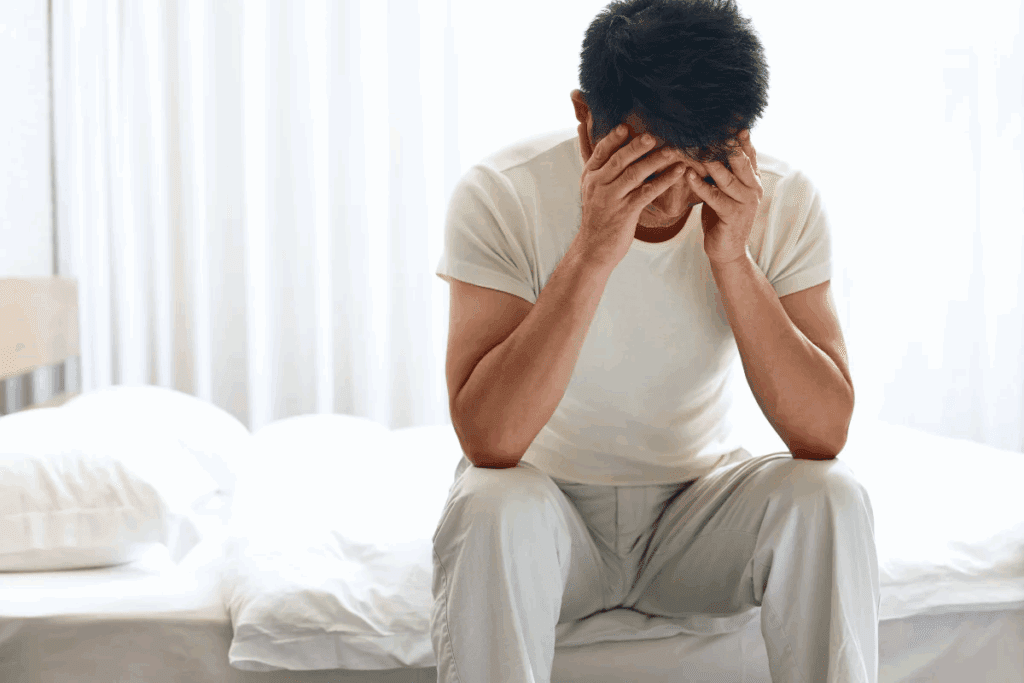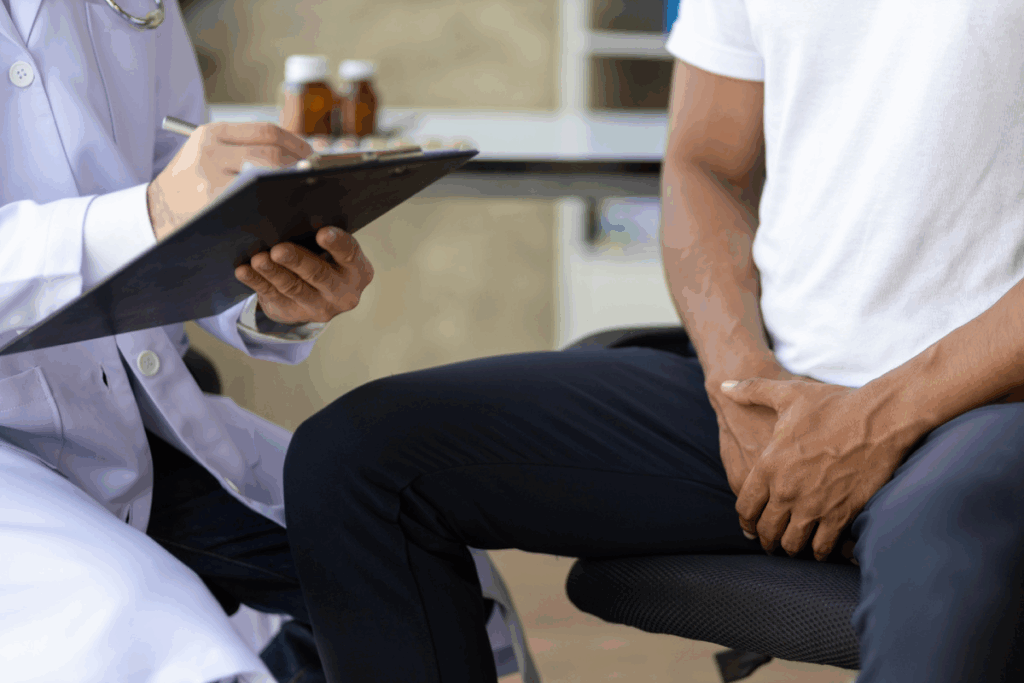
Can low blood pressure cause ED? Learn how hypotension can impact blood flow necessary for an erection and when to talk to your doctor.
Many men worry about the link between low blood pressure and erectile dysfunction. But, studies show that erectile dysfunction is more tied to high blood pressure than low. Medical Expert, a urologist at Medical organization, says erectile dysfunction is a common issue. It makes it hard for men to get and keep an erection.
We’ll dive into the complex tie between blood pressure and erectile dysfunction. We’ll clear up the myth that low blood pressure leads to erectile dysfunction. Our talk will be based on the latest research and expert views.

Erectile dysfunction (ED) is a common issue for many men around the world. It’s important to know what ED is and how it impacts men. ED means a man can’t get or keep an erection that’s good for sex.
ED is more common in older men. About half of men between 40 and 70 have some ED. By 2025, over 322 million people will face ED, showing it’s getting more common.
ED isn’t just for older men. It can hit men of all ages. This is due to many factors like lifestyle, health, and mental health. Knowing how widespread ED is helps us tackle it better.
Many things can cause ED, like vascular diseases, diabetes, and hormonal issues. Lifestyle choices like smoking and not exercising also play a part.
Let’s look at some main causes of ED:
| Cause | Description | Impact on ED |
| Vascular Diseases | Conditions affecting blood flow | Reduced blood flow to the penis |
| Diabetes | Chronic condition affecting blood sugar levels | Nerve damage and reduced blood flow |
| Neurological Disorders | Conditions affecting the nervous system | Disrupted nerve signals necessary for erection |
Knowing these causes helps doctors find the right treatments for ED. By tackling the root problems, they can help men improve their sex lives.

Understanding blood pressure is key to keeping your heart healthy. It shows how hard blood pushes against artery walls as the heart pumps. This is important for your health, affecting many body functions and your overall well-being.
Blood pressure is measured in millimeters of mercury (mmHg). It’s shown as two numbers: systolic and diastolic. Systolic is when the heart beats, and diastolic is when it rests. For example, 120/80 mmHg means systolic is 120 and diastolic is 80.
Knowing the blood pressure ranges is important for health. Normal blood pressure is below 120/80 mmHg. If it’s above 130/80 mmHg, it’s called hypertension. On the other hand, hypotension, or low blood pressure, is below 90/60 mmHg. Each condition affects health differently and needs proper care.
Blood pressure is vital for delivering oxygen and nutrients to organs and tissues. Too high or too low can cause health problems. High blood pressure can damage blood vessels, raising the risk of heart disease and stroke. Low blood pressure can lead to dizziness and fainting, or worse.
Keeping blood pressure healthy is essential for your overall well-being. It also affects your risk of heart disease and erectile dysfunction. Healthy blood vessels are important for sexual function.
Looking into how low blood pressure affects erectile function is important. Erectile dysfunction (ED) is complex, influenced by many factors. These include vascular health, neurological function, and hormonal balance.
Many think low blood pressure causes ED, but it’s not that simple. We’ll debunk common myths and look at the science. This will help us understand the link between low blood pressure and ED.
One myth is that low blood pressure hurts erectile function by cutting off blood to the penis. But, ED is more often linked to high blood pressure. High blood pressure can damage blood vessels and limit blood flow, which is key for an erection.
Another myth is that low blood pressure means not enough blood to the genitals. While blood pressure is important for erections, the body can adjust to keep blood flowing. In most cases, low blood pressure doesn’t directly cause ED.
Research has found interesting facts. Studies show high blood pressure, not low, is more linked to ED. Men with untreated high blood pressure are more likely to have reduced blood flow to the penis, which is key for erections.
Looking at the science, the connection between low blood pressure and ED isn’t simple. In fact, some studies say low blood pressure might not be a big risk for ED. Other health issues might be the main cause of ED in people with low blood pressure.
To really get how blood pressure and erectile function are connected, we need to look at the bigger picture. Things like overall vascular health, lifestyle, and other medical conditions are key. They affect both blood pressure and erectile function.
To understand how blood pressure affects erections, we need to know how erections work. Erections involve the brain, nerves, and blood vessels. When a man is sexually excited, blood flow to the penis increases, causing an erection.
Erections happen through a team effort of the brain, nerves, and blood vessels. When a man is turned on, his brain sends signals to the penis’s blood vessels. This makes them relax and get wider.
With more blood flowing into the penis, it gets bigger and harder. This is because of the blood filling the corpora cavernosa. The veins around these chambers then squeeze the blood in, keeping the penis erect.
Blood pressure is key for getting and keeping an erection. Low blood pressure can make it hard to get an erection because it reduces blood flow to the penis. But, how blood pressure affects erections is complicated. It depends on heart health and other medical issues.
To understand how blood pressure affects erections, let’s look at the main points:
| Factor | Role in Erectile Function | Impact of Low Blood Pressure |
| Blood Flow | Essential for achieving an erection | Reduced blood flow may impair erectile function |
| Vascular Health | Critical for blood vessel dilation and constriction | Poor vascular health may exacerbate the effects of low blood pressure |
| Neurological Signals | Necessary for initiating and maintaining an erection | Not directly affected by low blood pressure, but overall health may influence neurological function |
Knowing these factors is key for diagnosing and treating erectile dysfunction, even in those with low blood pressure. Doctors must look at heart health, nerve function, and sexual performance when treating patients.
Studies have found a strong link between high blood pressure and erectile dysfunction in men. High blood pressure can directly affect a man’s ability to get and keep an erection.
High blood pressure narrows and damages blood vessels all over the body. This includes the ones that supply blood to the penis. When these vessels are affected, it can block blood flow, causing erectile dysfunction (ED).
Many studies support the connection between high blood pressure and erectile dysfunction. Hypertension can cause vascular damage, reducing blood flow to the penis. This makes it hard to get an erection. Also, some blood pressure medications can make erectile dysfunction worse.
A study in the Journal of the American Society of Hypertension found, “Hypertension is a major risk factor for erectile dysfunction, and the prevalence of ED increases with the severity of hypertension.”
“The pathophysiology of erectile dysfunction in hypertensive patients is complex and multifactorial, involving vascular, neural, and hormonal factors.”
Statistics show a strong link between high blood pressure and erectile dysfunction. Men with untreated hypertension are more likely to have ED. Research found, “The prevalence of erectile dysfunction in men with hypertension is significantly higher than in those without hypertension.”
Managing high blood pressure is key for both heart health and sexual function. Understanding the link between hypertension and erectile dysfunction helps healthcare providers create better treatment plans. These plans address both conditions effectively.
“Treating hypertension can help mitigate some of the risks associated with erectile dysfunction,” say healthcare professionals. It’s important for men with high blood pressure to talk to their healthcare provider about their sexual health. This way, they can find the best treatment approach.
Many think low blood pressure leads to erectile dysfunction, causing worry. We’ll look into why this belief exists and what’s really going on.
People often link low blood pressure to erectile dysfunction because of its symptoms. Symptoms like dizziness and fainting can make someone think their blood pressure affects their sex life. Feeling weak or dizzy might make them believe their low blood pressure is causing erectile issues.
Another reason is the connection between heart disease risk factors and erectile dysfunction. Conditions like diabetes and obesity can harm both blood pressure and sex life. This makes people think low blood pressure and erectile dysfunction are linked.
Some symptoms of low blood pressure are mistaken for erectile dysfunction. For example:
It’s important to understand these differences. This helps people see the real connection between low blood pressure and erectile dysfunction. By knowing which symptoms are just symptoms, people can handle their health better and get the right medical help.
Many medications treat health issues but can also impact blood pressure and sex life. This is true for erectile dysfunction (ED) and its treatment.
Medications for high blood pressure can affect sex. Beta-blockers might make it harder to get an erection. They do this by reducing blood flow to the penis.
But not all blood pressure meds are the same. ACE inhibitors and calcium channel blockers might not have the same problem. They could even help with sex.
| Medication Type | Effect on ED |
| Beta-blockers | May cause or worsen ED |
| ACE inhibitors | Generally neutral or positive effect |
| Calcium channel blockers | Generally neutral or positive effect |
Other drugs can also affect sex. Some antidepressants, like SSRIs, can lead to ED.
Also, antipsychotics and certain antihistamines might cause sexual problems. It’s important to talk about sex with your doctor if you’re taking these.
Knowing how different meds can affect sex can help both patients and doctors. It leads to better choices in treatment.
It’s important to know how ED medications affect blood pressure. These drugs, like Viagra, have changed how we treat erectile dysfunction. But, they can also impact blood pressure, which is something doctors and patients need to watch.
PDE5 inhibitors boost blood flow to the penis, helping men get an erection. Viagra (sildenafil) and similar drugs make nitric oxide work better. This natural chemical relaxes penis muscles, letting more blood flow in.
“PDE5 inhibitors mainly affect blood vessels,” says Medical Expert, a top urologist. “They block the PDE5 enzyme. This lets muscles relax and blood vessels widen, helping men get an erection.”
While PDE5 inhibitors are usually safe, they can be risky for those with low blood pressure. Hypotension can get worse, causing dizziness, fainting, or serious heart problems.
People with low blood pressure or taking blood pressure meds should talk to their doctor first. It’s key to weigh the risks and benefits to ensure safe treatment.
Knowing how ED medications work and their blood pressure effects helps us manage erectile dysfunction safely. It also protects our heart health.
There’s a strong link between heart health and sexual function. The heart and blood vessels play a key role in sexual performance.
Good heart health is vital for sexual function. A healthy heart ensures blood flows well, including to the genitals. This is important for an erection.
The heart and sexual performance are connected through blood flow. A healthy cardiovascular system supports the process of getting an erection.
Blood pressure is a key factor. Low blood pressure can cause dizziness. But, it’s the heart’s health that really affects erections.
“The relationship between cardiovascular disease and erectile dysfunction is well-established, with shared risk factors and pathophysiological mechanisms.”
Improving heart health can boost sexual performance. Several lifestyle changes can help:
These changes improve heart health and sexual function.
| Lifestyle Change | Impact on Cardiovascular Health | Impact on Sexual Function |
| Regular Exercise | Improves heart health, boosts circulation | Enhances erectile function, improves stamina |
| Balanced Diet | Lowers blood pressure, improves lipid profiles | Supports overall sexual health, improves energy levels |
| Avoiding Smoking | Reduces risk of heart disease, improves circulation | Improves erectile function, enhances overall sexual performance |
By focusing on heart health, you can improve sexual function. It’s a holistic approach that benefits overall well-being.
Diagnosing erectile dysfunction needs a detailed approach. This includes looking at blood pressure among other health factors. Erectile dysfunction, or ED, makes it hard for a man to get or keep an erection for sex. It’s important to understand how blood pressure and ED are connected for diagnosis and treatment.
Healthcare providers start with a detailed medical history and physical check-up to diagnose ED. This helps find possible causes like heart disease, diabetes, or hormonal issues linked to blood pressure. Blood tests might check for hormones, diabetes, or cholesterol. Special tests like penile plethysmography or duplex ultrasonography can also check penis blood flow.
Key diagnostic considerations include:
Treating ED requires looking at the person’s overall health, including blood pressure. Men with hypotension (low blood pressure) might not be able to use some ED meds because they could lower blood pressure more. On the other hand, men with hypertension (high blood pressure) need to manage their blood pressure while treating ED. Oral meds like sildenafil (Viagra) or tadalafil (Cialis) are often effective but need careful use in men with certain blood pressure issues.
Safe treatment strategies may involve:
Changing your lifestyle can help both blood pressure and erectile function. Regular exercise, a healthy diet, staying at a healthy weight, and quitting smoking can boost heart health and improve erections. Stress management through meditation or yoga can also help.
Recommended lifestyle modifications include:
By treating blood pressure and ED with both medical care and lifestyle changes, men can improve their sexual health and overall well-being.
Knowing when to see a doctor for erectile dysfunction is important. ED can be a sign of a bigger health problem. It’s key to get it checked out.
If you have persistent erectile dysfunction, it’s time to see a doctor. This is true if you also have chest pain or dizziness. Here are some signs you should not ignore:
These signs might mean you have a serious health issue. For example, ED can be a sign of cardiovascular disease.
Before you go to the doctor, get ready. Here’s how:
Being ready for your appointment helps you have a good talk with your doctor. Health experts say knowing your medical history and current health is key to treating ED well.
“Erectile dysfunction is often a symptom of an underlying condition that can be treated. By seeking medical attention, individuals can address not only their ED but also potentially serious health issues.”
Talking to a healthcare provider about erectile dysfunction is a smart move. It helps you tackle the problem and improve your health. By knowing when to seek help and being ready for your appointment, you can take charge of your health.
Understanding the link between blood pressure and erectile dysfunction is key for good sexual health. We’ve looked into how low blood pressure and erectile dysfunction are connected. We also saw how heart health is vital for keeping erectile function strong.
Improving heart health and making healthy lifestyle choices can boost erectile function and overall health. This means eating right, exercising regularly, and managing stress. These actions help improve sexual health.
Keeping the heart healthy is critical for great sexual performance. We stress the need for a full approach to sexual health. This includes regular health checks and talks with doctors to handle low blood pressure and erectile dysfunction well.
By focusing on heart health and erectile dysfunction, people can greatly improve their life and sexual health. This all-encompassing method helps tackle the complex relationship between heart health and erectile dysfunction. It leads to better health results.
Low blood pressure itself doesn’t directly cause erectile dysfunction. But, conditions that lead to low blood pressure might affect it.
Low blood pressure doesn’t directly cause erectile dysfunction. But, symptoms like dizziness can indirectly affect sexual performance.
Yes, high blood pressure is linked to erectile dysfunction. It can damage blood vessels and limit blood flow, making erections harder.
ED medications, like Viagra, can lower blood pressure. People with low blood pressure should talk to their doctor before using these drugs.
Yes, good cardiovascular health is key for erectile function. Regular exercise, a balanced diet, and managing hypertension can improve blood flow and sexual performance.
If you have persistent or recurring erectile dysfunction, see a doctor. Also, seek medical help for sudden or severe erectile dysfunction, pain during erections, or other concerning symptoms.
Yes, several lifestyle changes can help both blood pressure and erectile dysfunction. These include regular exercise, a healthy diet, stress management, and avoiding smoking.
Some blood pressure medications might affect erectile function. But, the impact varies. Newer blood pressure drugs might have less effect on sexual function.
Diagnosing erectile dysfunction involves a thorough medical check-up, including blood pressure and cardiovascular health assessment. Safe treatments are available, including lifestyle changes and medications, for various blood pressure levels.
National Center for Biotechnology Information. (2025). Does Low Blood Pressure Cause Erectile Dysfunction Many. Retrieved from https://pubmed.ncbi.nlm.nih.gov/28993149/>
Subscribe to our e-newsletter to stay informed about the latest innovations in the world of health and exclusive offers!
WhatsApp us